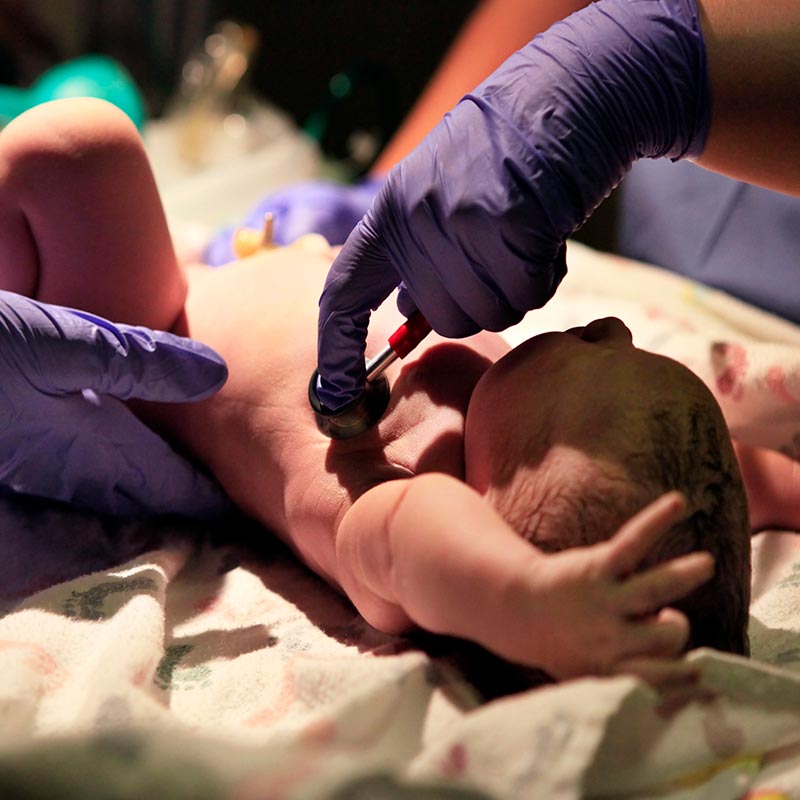Neonatal strokes (sometimes referred to as perinatal strokes) occur in up to 1 in 3,500 newborns. According to the American Heart Association, they are one of the most significant causes of neurological impairment in children and one of the most leading causes of Cerebral Palsy. Timely diagnosis and quick treatment are essential to reduce the impact of a fetal stroke injury. Every parent has one thing in common: they want their babies to be healthy.
Luckily, Washington, DC is the home to the top pediatric hospitals in the United States. However, even with the top care in the country, birth injury catastrophes can still happen.
Contact Us Today to Schedule
A Free Consultation
In most cases of neonatal strokes, nothing could have been done to prevent it from happening. However, there are instances when doctors fail to recognize the signs of a stroke and treat the baby properly.
The birth injury attorneys at Regan Zambri Long have decades of experience in medical malpractice suits. Their legal team consists of a registered nurse and medical consultants who not only help prepare the suit, but also help clients with the medical needs of their children. The attorneys understand that nothing could have prepared parents for the challenges they’ll face after their baby suffers a neonatal stroke, but they will work diligently to secure financial compensation so your child can receive best medical care for as long as necessary.
There are also circumstances where the baby suffers a stroke due to the trauma of birth, when the doctors use forceps or vacuum extraction in a negligent way. If you believe your newborn suffered a neonatal stroke birth injury as a result of medical negligence, then you have rights to compensation.

A stroke occurs when the blood flow to an infant’s brain is interrupted or reduced, preventing the brain from getting oxygen and nutrients. It can be a blockage or breakage of a blood vessel in the brain. When this happens, brain cells begin to die within minutes, causing brain damage. A neonatal stroke is when a stroke happens in a newborn baby, usually within the first month.
There are two different types of neonatal strokes. The first is called an Arterial Ischemic Stroke. This is when there is a blood clot and/or narrowed or damaged arteries that obstruct the flow of blood to the baby’s brain. Blood clots and damaged arteries in newborns can happen for several reasons, including blood diseases like Sickle Cell Anemia or genetic disorders like Moyamoya, which is a rare disease that affects the arteries in the brain. A heart defect present at birth, or if the baby is born with heart disease that causes clotting, they are at greater risk of suffering an Arterial Ischemic Stroke. Strokes can also occur if the baby doesn’t have enough oxygen during birth or if the baby is dehydrated. Abnormal blood clotting around the time of birth or trauma to the baby’s head and neck during delivery can also lead to blood clots, damaged arteries, and Ischemic strokes.
These strokes can also be the result of problems that affected the mother during pregnancy. If the mother develops preeclampsia (high blood pressure during pregnancy that causes swelling in the hands, feet, and legs) or a placental abruption (when the placenta partly or completely separates from the inner wall of the uterus before delivery) the risk of stroke in the baby is greater. The doctors need to closely monitor the baby for signs of stroke. Other maternal problems that can cause Arterial Ischemic Stroke are:
The second type of neonatal stroke is a Hemorrhagic Stroke, which is when there is bleeding in the baby’s brain. These types of strokes can be caused by head injuries or trauma to the baby that results in broken blood vessels. Arteriovenous malformation, a condition in which the blood vessels in the brain don’t connect properly, or an aneurysm, which is weakness in artery walls, can also cause this type of neonatal stroke. Finally, if the baby suffers from Hemophilia, a disease that affects blood clotting, then he is at greater risk of a Hemorrhagic Stroke and needs to be closely monitored.
Symptoms vary and it is possible that newborns do not show early signs of stroke. However, the most common early sign of a neonatal stroke is a seizure, which can present as twitching of the face, arm, or leg. You can also detect a seizure if the child pauses in breathing while staring at seemingly nothing. As the child develops, the signs to recognize are:
Since the signs and symptoms of neonatal stroke are not easy to detect, a diagnosis is also difficult. However, if a stroke is suspected the doctor will order blood tests, an MRI, and a CAT scan. Other diagnosis tools include MRA (Magnetic Resonance Angiography), which is an MRI of specific arteries and an MRV (Magnetic resonance venography), which is an MRI of specific veins. A lumbar puncture, also known as a spinal tap, is also used to detect strokes in newborns.
While most of the causes of strokes listed above are unseen and not preventable, there are medical errors that can directly lead to fetal stroke injuries. These avoidable errors include:
These errors can also cause other types of birth injuries to the baby and even to the mother. The Regan Zambri Long birth injury attorneys have handled cases where infants suffered broken bones, head injuries, and spinal injuries. They have also seen serious complications in maternal injuries, including uterine rupture and infection.
Medical errors are difficult to prove, which is why you should contact a Regan Zambri Long birth injury lawyer for a free consultation, call us (202)960-4746. An experienced attorney can help you navigate the claims process, while you focus on getting the best care for your child. It is important to note that your lawyer will need to collect as much evidence as possible of birth injury malpractice. So, keep all your medical records – no information is too much information. Save everything and be as thorough as possible. Document treatments before, during, and after your baby’s delivery. Finally, save any scans done on your child, like EEG, MRI, or CT scans.
Regan Zambri Long medical malpractice lawyers have won millions for their clients in malpractice suits. Recently, they secured a $4.1 million settlement for a family whose child suffered brain damage and cerebral palsy due to the negligence of the doctors and nurses. The money secured allowed the family to care for their child at home with the necessary equipment and health care providers. This case also resulted in the hospital changing safety rules and required the doctors who tend to premature babies to do more training. Their expertise is in complicated cases and they will fight fiercely for proper compensation for you and your family. The birth injury lawyers at Regan Zambri Long have a deep understanding that a family’s life is turned upside down after a neonatal stroke and they have to face unique challenges every day. While trying your case, the attorneys also assist families with care plans for their children and provide information regarding resources and professional services in the D.C. area.

Most doctors use neonatal and perinatal strokes interchangeably. However, some distinguish neonatal strokes from perinatal in when they occur. Neonatal strokes occur from birth up until 28 days. Perinatal strokes can begin while the fetus is still in utero (typically around the 28th week of pregnancy) and occur until 28 days of life.
Because neonatal strokes are difficult to diagnose, this figure is not exact. However, according to the American Heart Association, neonatal strokes occur in 1 in every 3,500 live births.
Strokes do not discriminate. They can occur in anyone at any time – as infants, toddlers, teenagers, and through adulthood. Right now, the U.S. healthcare system cannot provide reliable reporting on the incidence, the cause, or the outcome of strokes in children. According to The Project for Expansion of Education in Pediatric Stroke, boys are more likely to suffer from strokes than girls and African-American children are more likely to suffer from strokes than White or Asian children.
A fetal stroke injury could result in your infant having Cerebral Palsy or mental retardation. Neonatal strokes can also cause paralysis, communication problems, vision loss, and psychological and behavioral difficulties.
If the newborn is having seizures due to the stroke, then doctors can mitigate the seizures with different medications, called anticonvulsants. Blood-thinning medications are also used if the baby suffers an Ischemic stroke due to blood clots. The infants will also be closely monitored to make sure they are properly hydrated and may be put on IV fluids to maintain hydration. Their blood sugar may also be monitored to make sure it stays in control. If the baby suffered from a hemorrhagic stroke, then surgery may be necessary to manage brain pressure because of the bleeding. If the baby is having neonatal strokes due to a heart condition, then the doctors will treat the heart condition accordingly to prevent future strokes.
The risk of your child having another stroke is extremely low unless they have severe blood clotting disorders or heart disease.
The general statute of limitations on a Washington, DC malpractice lawsuit is three years. However, DC applies the “discovery rule” to this statute. The Discovery Rule states that the three-year limit begins when the plaintiff (the person who files the malpractice suit) ‘discovers or reasonably should have discovered that they were victims of medical malpractice. This is why it is extremely important to have a birth injury attorney by your side. It is up to the plaintiff to prove that the defendant (the party being sued) was negligent. A skilled attorney will be able to gather the evidence, speak to other doctors, and pour over medical records to determine how to prove fault.
Yes. If it is determined that you are in any way responsible for the injury that took place, then you will be barred from collecting damages. Though it is uncommon that the victim played any role in medical malpractice, it is important to have a birth injury lawyer on your side in case the doctors or hospitals try to make the claim that you hold responsible for your injury.
Each birth injury case is unique, so there is no single estimate of how long a case will take to be resolved. However, Regan Zambri Long has the financial backing to take on large hospitals and insurance companies. You can rest assured that your lawyer will be with you every step of the process until a settlement or verdict is reached. Birth injury lawyers do not work on a retainer, so you will not have to pay your attorney until you receive a settlement.